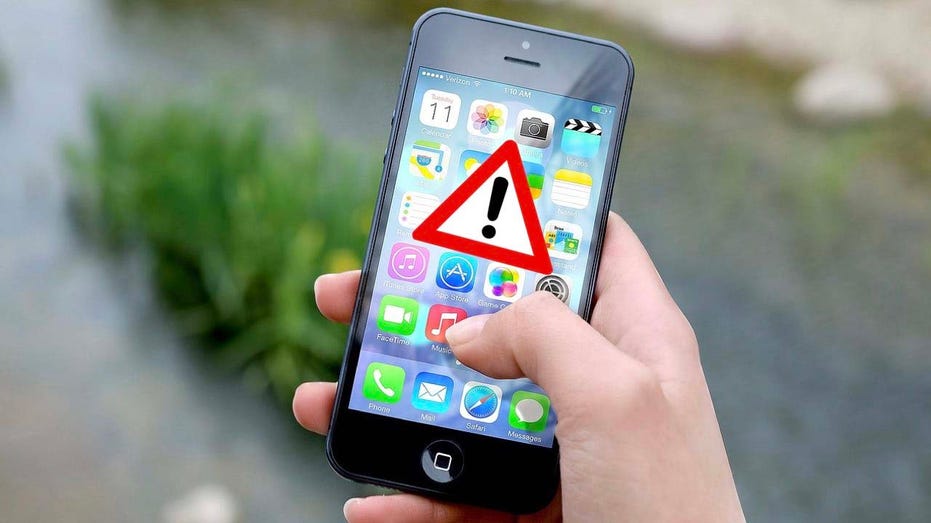- by foxnews
- 08 Apr 2025
My iPhone says I have 14 viruses. What should I do next?
Getting virus alerts on your iPhone? Tech expert Kurt "CyberGuy" Knutsson helps you learn how to handle fake scam alerts and boost security.
- by foxnews
- 07 Nov 2024
- in technology

Although iPhones have robust security features, they are not entirely immune to threats. While they are generally safer from viruses and malware than Android devices, no device is completely invulnerable.
This point was reinforced by a strange experience that caught our attention when "Pam" of Mesa, Arizona, wrote to us, "My iPhone says I have 14 viruses. What program can I [install] to help with my phone? How can I [make] my phone safe?"
Well, Pam, we're more than happy to explore why you are getting strange messages on your iPhone suggesting that there were 14 viruses on it. There are various reasons why you could be seeing these types of messages, and there are workarounds to make your phone safe again.
The iPhone is less vulnerable to viruses and malware due to its closed-code design. This means that Apple doesn't share all of its code information, which makes it harder for hackers to exploit vulnerabilities to take over a user's apps or iPhone. It's important to note that Apple will never send you an alert via pop-up, text or email that you have a virus on your device.
Below are several reasons why you could get notifications on your iPhone about viruses, which you may or may not actually have.
1) Pop-up ads: You may not actually have any viruses or malware on your iPhone. Instead, it can be an ad that pops up from your mobile browser stating that you have viruses or malware on your iPhone. These can scam you in a couple of ways:
2) Fake apps: Some scammers have fake apps that display fake alerts about viruses or malware to scare people to download their apps or purchase their services to get rid of these fake problems.
3) Phishing scams: This alert about viruses can be a scam email or text message claiming you have viruses or malware that need to be eradicated from your device. Do not click on any links or call any numbers as it will likely transfer you to the actual scammer, who will likely hard sell you to buy their services, part with private and financial information or give them access to your iPhone.
Even though it is more difficult to penetrate the iPhone, it doesn't mean it is impossible. In fact, some hackers watch for particular vulnerabilities in iOS to launch their attacks. If you see such warnings, it's best to ignore them and avoid clicking on any links or downloading any suggested software. Below are several key steps you can take to secure your iPhone.
2) Install and run strong antivirus software: An antivirus software actively running on all of your devices can help keep them all safe, including your iPhone. With iPhones, strong antivirus software will prevent you from clicking on any malicious links that may then install malware onto your devices, which can potentially extract personal information from your device. Avoid clicking on suspicious links or downloading attachments from unknown sources. These can be phishing attempts designed to steal your personal information.
3) Download apps only from the App Store: Stick to downloading apps from the official Apple App Store. Apps on the App Store are vetted by Apple for security, reducing the risk of downloading malicious software.
While most iPhone users rest easy knowing that the iOS keeps most common viruses and malware at bay, they are still susceptible to scammers trying to work around the closed code and scaring people into making bad choices that endanger their phones and data. Because Apple never sends out alerts about viruses or malware on your iPhone, it should be the first clue of a scam. Even if it looks official, iPhone users do not get alerts from Apple about viruses or malware. If you do install a good antivirus program, that will be the only program notifying you that there is anything amiss with your iPhone. Understanding these scams can go a long way in keeping you calm and your phone safe.
Follow Kurt on his social channels:
Answers to the most asked CyberGuy questions:
New from Kurt:
Copyright 2024 CyberGuy.com. All rights reserved.
- by foxnews
- descember 09, 2016
Ancient settlement reveals remains of 1,800-year-old dog, baffling experts: 'Preserved quite well'
Archaeologists have recently unearthed the remarkably well-preserved remains of a dog from ancient Rome, shedding light on the widespread practice of ritual sacrifice in antiquity.
read more





